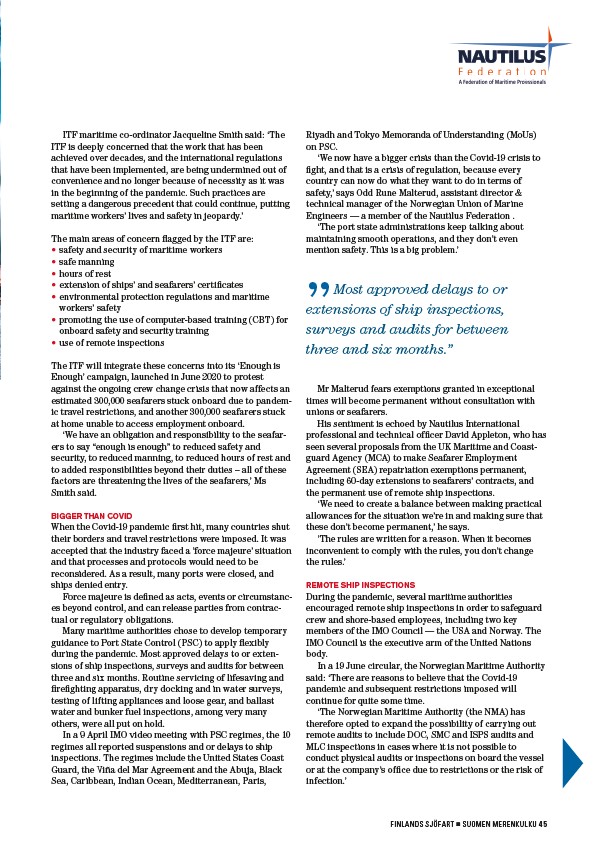
”Most approved delays to or
extensions of ship inspections,
surveys and audits for between
three and six months.”
FINLANDS SJÖFART J SUOMEN MERENKULKU 45
ITF maritime co-ordinator Jacqueline Smith said: ‘The
ITF is deeply concerned that the work that has been
achieved over decades, and the international regulations
that have been implemented, are being undermined out of
convenience and no longer because of necessity as it was
in the beginning of the pandemic. Such practices are
setting a dangerous precedent that could continue, putting
maritime workers’ lives and safety in jeopardy.’
The main areas of concern flagged by the ITF are:
• safety and security of maritime workers
• safe manning
• hours of rest
• extension of ships’ and seafarers’ certificates
• environmental protection regulations and maritime
workers’ safety
• promoting the use of computer-based training (CBT) for
onboard safety and security training
• use of remote inspections
The ITF will integrate these concerns into its ‘Enough is
Enough’ campaign, launched in June 2020 to protest
against the ongoing crew change crisis that now affects an
estimated 300,000 seafarers stuck onboard due to pandem-ic
travel restrictions, and another 300,000 seafarers stuck
at home unable to access employment onboard.
‘We have an obligation and responsibility to the seafar-ers
to say “enough is enough” to reduced safety and
security, to reduced manning, to reduced hours of rest and
to added responsibilities beyond their duties – all of these
factors are threatening the lives of the seafarers,’ Ms
Smith said.
BIGGER THAN COVID
When the Covid-19 pandemic first hit, many countries shut
their borders and travel restrictions were imposed. It was
accepted that the industry faced a ’force majeure’ situation
and that processes and protocols would need to be
reconsidered. As a result, many ports were closed, and
ships denied entry.
Force majeure is defined as acts, events or circumstanc-es
beyond control, and can release parties from contrac-tual
or regulatory obligations.
Many maritime authorities chose to develop temporary
guidance to Port State Control (PSC) to apply flexibly
during the pandemic. Most approved delays to or exten-sions
of ship inspections, surveys and audits for between
three and six months. Routine servicing of lifesaving and
firefighting apparatus, dry docking and in water surveys,
testing of lifting appliances and loose gear, and ballast
water and bunker fuel inspections, among very many
others, were all put on hold.
In a 9 April IMO video meeting with PSC regimes, the 10
regimes all reported suspensions and or delays to ship
inspections. The regimes include the United States Coast
Guard, the Viña del Mar Agreement and the Abuja, Black
Sea, Caribbean, Indian Ocean, Mediterranean, Paris,
Riyadh and Tokyo Memoranda of Understanding (MoUs)
on PSC.
‘We now have a bigger crisis than the Covid-19 crisis to
fight, and that is a crisis of regulation, because every
country can now do what they want to do in terms of
safety,’ says Odd Rune Malterud, assistant director &
technical manager of the Norwegian Union of Marine
Engineers — a member of the Nautilus Federation .
‘The port state administrations keep talking about
maintaining smooth operations, and they don’t even
mention safety. This is a big problem.’
Mr Malterud fears exemptions granted in exceptional
times will become permanent without consultation with
unions or seafarers.
His sentiment is echoed by Nautilus International
professional and technical officer David Appleton, who has
seen several proposals from the UK Maritime and Coast-guard
Agency (MCA) to make Seafarer Employment
Agreement (SEA) repatriation exemptions permanent,
including 60-day extensions to seafarers’ contracts, and
the permanent use of remote ship inspections.
‘We need to create a balance between making practical
allowances for the situation we’re in and making sure that
these don’t become permanent,’ he says.
’The rules are written for a reason. When it becomes
inconvenient to comply with the rules, you don’t change
the rules.’
REMOTE SHIP INSPECTIONS
During the pandemic, several maritime authorities
encouraged remote ship inspections in order to safeguard
crew and shore-based employees, including two key
members of the IMO Council — the USA and Norway. The
IMO Council is the executive arm of the United Nations
body.
In a 19 June circular, the Norwegian Maritime Authority
said: ‘There are reasons to believe that the Covid-19
pandemic and subsequent restrictions imposed will
continue for quite some time.
‘The Norwegian Maritime Authority (the NMA) has
therefore opted to expand the possibility of carrying out
remote audits to include DOC, SMC and ISPS audits and
MLC inspections in cases where it is not possible to
conduct physical audits or inspections on board the vessel
or at the company’s office due to restrictions or the risk of
infection.’